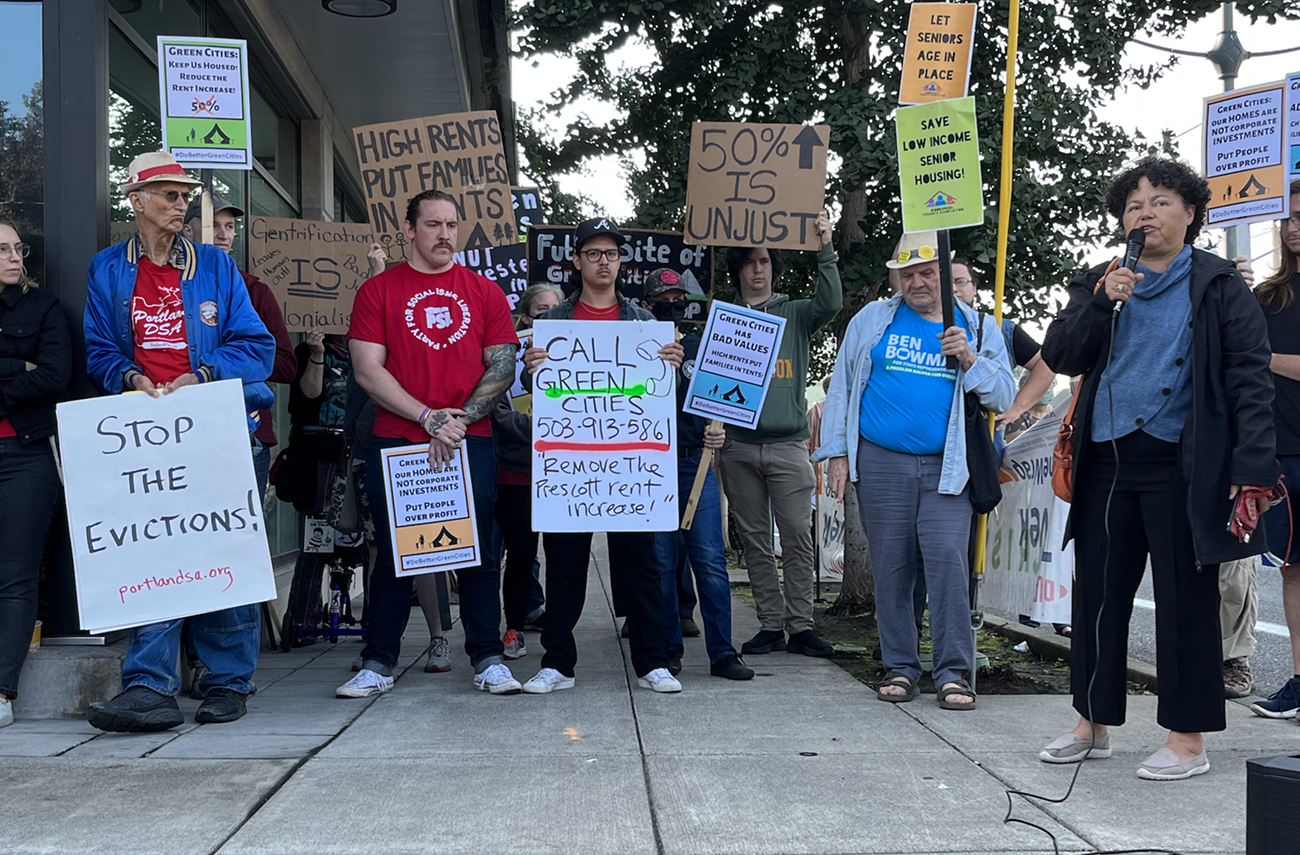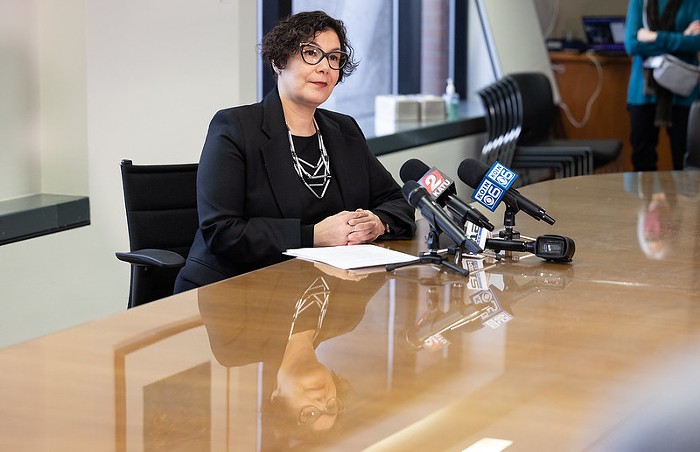A group of tenants living in city-established affordable housing in Portland's Overlook neighborhood declared victory Friday for successfully stalling major proposed rent hikes at their apartment complex, the Prescott.
"We as tenants were able to stand up against this and come to a really good resolution," said tenant Kelsey Schreiner, who was notified in August that her rent would raise 50 percent in November. "People think that's so far-fetched. But, one thing I've learned in the past few months is that anything is possible."
Instead of having to pay hundreds more in monthly rent starting November 1, tenants and legal aide representatives convinced the Prescott's owners—a company called Green Cities—to delay the rent increases for 18 months, allowing renters time to relocate if needed.
"I've been so stressed out and anxious about this for the last two months," said Schreiner. "But it feels so good to know our work has actually paid off. "
Schreiner’s two-bedroom apartment that she shares with her four-year-old daughter is one of 31 units in the Prescott that are designated “affordable” under a city of Portland program that waives property tax for building owners who keep a portion of their residential units below market rent. That program, called the Multiple-Unit Limited Tax Exemption (MULTE), requires participating landlords to make 20 percent of their apartment’s units affordable to people making at least 60 percent of the region’s median family income, or MFI. Based on the most recent calculations, a two-bedroom apartment at 60 percent MFI cannot cost more than $1,438 monthly.
Up until this summer, Schreiner's landlord had voluntarily kept rents much lower than the 60 percent requirement. But when a company called Green Cities purchased the Prescott last year, the new owners decided to increase her and other tenants' rent to the highest possible amount allowed under MULTE rules. For Schreiner, that was an additional $400 tacked on to her monthly rent.
Green Cities' rent hike also dodges the state’s rent control law, enacted in early 2019, which sets an annual percentage cap for how high landlords may raise rents. At the moment, that law prohibits landlords from raising rents more than 9.9 percent. Yet the law carves out an exemption for rental properties that are less than 15 years old. The Prescott was built nine years ago, allowing its owners to stick tenants with a 50 percent rent increase.
Despite being legal, the rent hike felt untenable for dozens of Prescott tenants living in MULTE apartments. Several said they would have to move if the rent increase went through.
In early October, tenants and supporters held a rally near the Prescott apartment complex, calling on Green Cities to rescind the rent increase and asking the city to act to address loopholes within the MULTE program that allow low-income tenants to still be priced out of affordable units.
In response, Green Cities offered to delay the rent hike three months—but it wasn't an agreement tenants felt comfortable with. After weeks of organized tenant pressure on Green Cities management, the property owners finally agreed to an 18-month delay this Wednesday. Green Cities rescinded their previous rental hike notices in writing to MULTE tenants on Thursday, and has issued new notices with a pledge not to increase rent until June 2024.
According to tenant advocate Margot Black, that agreement came after the city—and Green Cities—were threatened with legal action from attorneys representing the Prescott tenants. Lawyers with Legal Aid Services of Oregon (LASO) found that, for some Prescott tenants, the proposed rent hikes actually fell above the MFI limit for MULTE housing. In short, lawyers found that the city had allowed Green Cities to charge above the legal limit for affordable housing.
City Commissioner Dan Ryan, who oversees the city's housing bureau, said his office helped facilitate conversations between Green Cities and LASO over the past several weeks to push this agreement through. Tenants at the Prescott say they never were contacted by Ryan's office to gather their feedback on the issue.
"We saw our office as a convener and a bridge," said Kellie Torres, who serves as Ryan's chief of staff.
Following the October tenant rally, Ryan announced he'd be holding a council work session to discuss rental housing stabilization programs, including MULTE, on November 1.
For Black, who has helped organize Prescott tenants since they received the rent increases, the combined loopholes that allowed this rent increase to exist in the first place are what the city needs to focus on going forward—especially in light of Mayor Ted Wheeler and City Commissioner Dan Ryan's recent push to address the city's homeless crisis.
"We've exposed a very real problem," said Black. "We're not exaggerating when we talk about this preventing homelessness. People at the Prescott were homeless before moving in there. If people are being priced out and evicted from affordable housing for non-payment, that is a broken system. And it's creating homelessness... from programs that are publicly subsidized to prevent homelessness."
On Friday, Schreiner said she and other Prescott tenants are intent on helping other Portland renters fight damaging rent hikes and eviction threats.
"Do not think that because a landlord presents you with a new lease or a new rent increase that that is the end of the conversation," said Schreiner. "You can push against that. If you stand up and unite as a group, you can make your voices heard. Before two months ago, I didn't know that was possible."




















